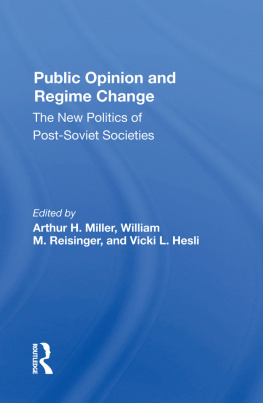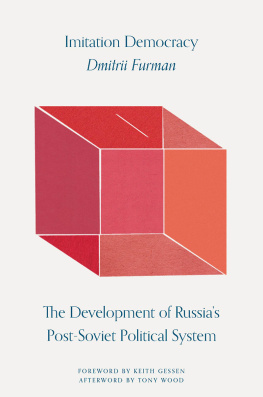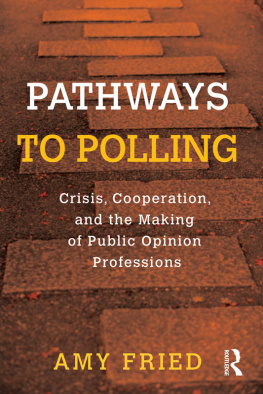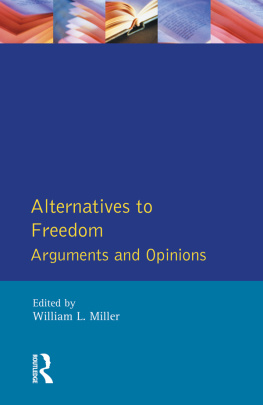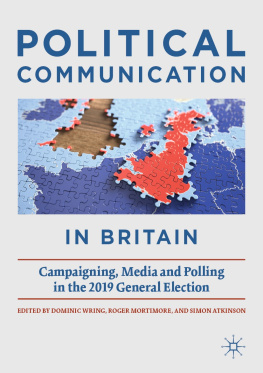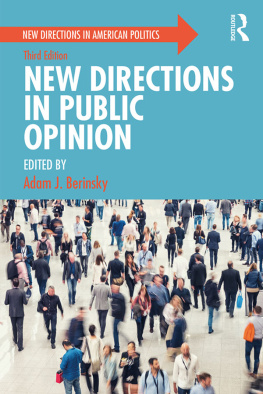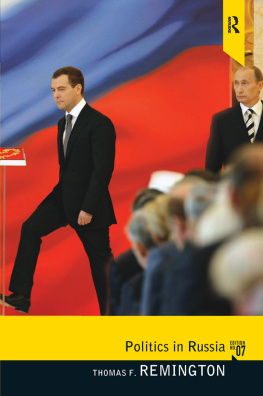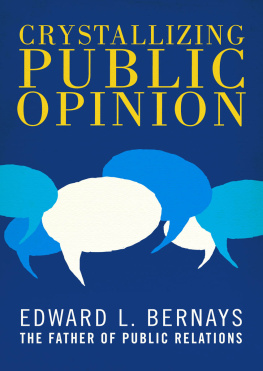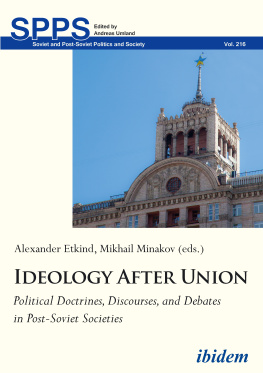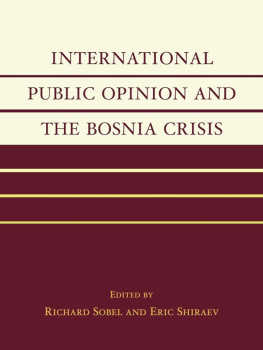Public Opinion and Regime Change
Public Opinion and Regime Change
The New Politics of Post-Soviet Societies
Edited by
Arthur H. Miller, William M. Reisinger, and Vicki L. Hesli
First published 1993 by Westview Press, Inc.
Published 2019 by Routledge
52 Vanderbilt Avenue, New York, NY 10017
2 Park Square, Milton Park, Abingdon, Oxon OX14 4RN
Routledge is an imprint of the Taylor & Francis Group, an informa business
Copyright 1993 Taylor & Francis
All rights reserved. No part of this book may be reprinted or reproduced or utilised in any form or by any electronic, mechanical, or other means, now known or hereafter invented, including photocopying and recording, or in any information storage or retrieval system, without permission in writing from the publishers.
Notice:
Product or corporate names may be trademarks or registered trademarks, and are used only for identification and explanation without intent to infringe.
Library of Congress Cataloging-in-Publication Data
Public opinion and regime change : the new politics of post-Soviet societies / edited by Arthur H. Miller, William M. Reisinger, and Vicki L. Hesli.
p. cm.
Includes bibliographical references and index.
ISBN 0-8133-1503-4
1. Public opinionSoviet UnionCongresses. 2. Public opinionFormer Soviet republicsCongresses. 3. Political cultureSoviet UnionCongresses. 4. Political cultureFormer Soviet republicsCongresses. 5. Soviet UnionPolitics and government1985-1991Congresses. 6. Former Soviet republicsPolitics and government Congresses. I. Miller, Arthur H., 1942- . II. Reisinger, William M. (William Mark), 1957 - . III. Hesli, Vicki L.
HN530.Z9P8675 1993
303.3'8dc20
92-26354
CIP
ISBN 13: 978-0-367-28472-5 (hbk)
Contents
, Arthur H. Miller and Vicki L. Hesli
PART ONE
CONDUCTING PUBLIC OPINION RESEARCH IN THE SOVIET UNION
, Elena I. Bashkirova and Vicki L. Hesli
, Jeffrey W. Hahn
PART TWO
HOW CITIZENS RELATE TO POLITICS: INDIVIDUALS, GROUPS, AND THE POLITICAL SYSTEM
, Michael Paul Sacks
, Andrei Yu. Melville
, James L. Gibson and Raymond M. Duch
, Arthur H. Miller
, Vicki L. Hesli and Joel D. Barkan
, Cynthin S. Kaplan
, William M. Reisinger and Alexander I. Nikitin
, Thomas F. Remington
PART THREE
PUBLIC OPINION AND THE ECONOMY
, John P. Willerton and Lee Sigelman
, Gennady M. Denisovsky, Polina M. Kozyreva, and Mikhail S. Matskovsky
PART FOUR
PUBLIC OPINION AND FOREIGN POLICY
, Lois W. Sayrs and James M. Lindsay
, William Zimmerman
, William M. Reisinger
Guide
Without the political renewal that Mikhail Gorbachev initiated in the Soviet Union after coming to power in 1985, this book would not exist. The transformation of the union and the new opportunities it created for examining the change process through survey research methods are precisely the focus of this book. Gorbachev's revival of glasnost and the extension of new freedoms gave us the opportunity to collaborate with Soviet scholars in conducting the studies reported here.
Funding from a number of sources made it possible to carry out the research and produce this volume. Primary funding for the University of Iowa team came from the National Science Foundation in the form of two grants: first, a Seed Grant for Exploratory Research (SGER grant number SES-9009698) to conduct the New Soviet Citizen Survey, described in the Appendix, during mid-1990; and second, a research grant (NSF grant number SES-9023974) to extend the survey work into 1991 and 1992. The Soviet support for the project derived from a variety of sources, including the following: the Soviet Peace Committee, the Soviet Peace Fund, the Center for Political and International Studies, the Center for International Projects, and the Institute of Sociology within the USSR Academy of Sciences. Furthermore, several of the individual contributors to this volume had research funding, which they acknowledge in their own chapters.
In addition, all of the authors of this volume were invited to present preliminary drafts of their chapters at a conference held at the University of Iowa in Iowa City in November 1990. The conference was primarily supported by the Political Science Department's Benjamin F. Shambaugh Memorial Fund. Supplemental funding was obtained from the Soros Foundation, the University of Iowa Social Science Institute, and the Midwest Universities Consortium for International Affairs.
A project of this magnitude could never be accomplished without the assistance and contributions of many people. For helping to move this book toward completion, we wish to specifically thank the following individuals: Kristen Maher, with the assistance of Michelle Ray, was responsible for editing the text and producing tables and figures. A number of people from the Iowa Social Science Institute assisted in the data file preparation and the statistical analysis, including Chia-Hsing Lu, Peggy Dozark, Erik Reyerson, John Engel, and Mary Morrisey. Secretarial assistance on grant applications, Shambaugh conference papers, arid the final book manuscript was provided by Karen Stewart, Jeanne Stoakes, and Peggy Swails.
Finally, we wish to thank all the contributors to this book for their constructive criticism, collegiality, and encouragement as this volume moved from initial design to finished product.
Arthur H. Miller
William M. Reisinger
Vicki L. Hesli
Arthur H. Miller and Vicki L. Hesli
New Opportunities for Monitoring Soviet Political Change with Survey Research
Following the death of Konstantin Chernenko in March 1985, Mikhail Gorbachev became General Secretary of the Communist Party of the Soviet Union. The sweeping reforms initiated under his direction set into motion a modern revolution that transformed the character of Soviet politics. The magnitude of political change unleashed in the seven years of Gorbachev's power was unprecedented in the history of the Soviet state.
For over 70 years, the Communist Party of the Soviet Union (CPSU) had control over the state, the means of production and most information about society and the outside world. No organized opposition was allowed to the Communist party or to the official ideology of Marxism-Leninism, Nevertheless, within the brief period from 1985 to 1991, dramatic change occurred in all significant aspects of the Soviet political system.
Gorbachev's policy of glasnost led to reduced state control over information and expanded rights for the press and citizens to be truthful about the past and critical of present shortcomings. As the mistakes of the past and the social problems of the present gained exposure, so did the growing evidence of the huge economic gap between the Soviet Union and Western industrial societies. Public discussions questioning the fundamental principles of Soviet government and the state regulated economy became increasingly widespread. Marxist-Leninist ideology came under attack, and actions aimed at abandoning the controlled economy were openly debated. The "new thinking" of glasnost focused on redefining the role of the Soviet Union in the world order. The Soviet posture shifted from expansionist to peace-oriented, as the Cold War and Soviet domination of Eastern Europe came quickly to an end.

